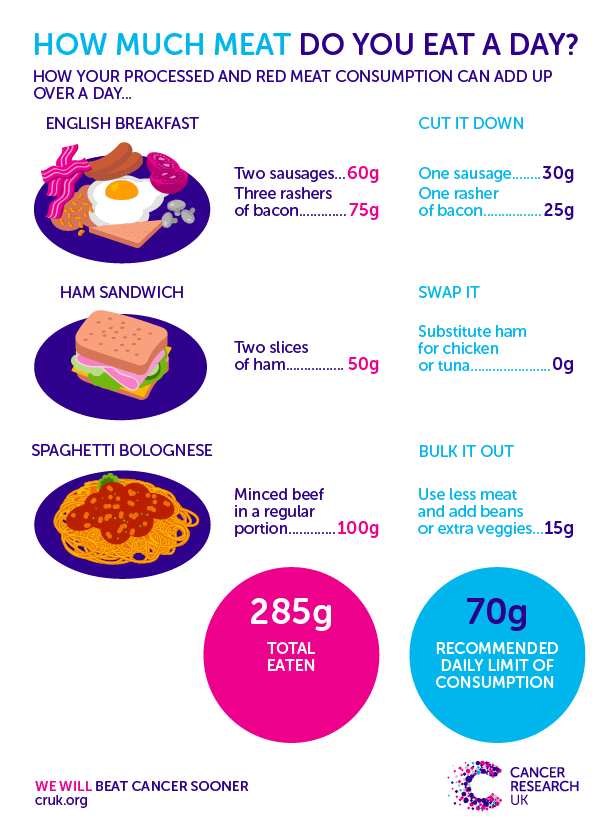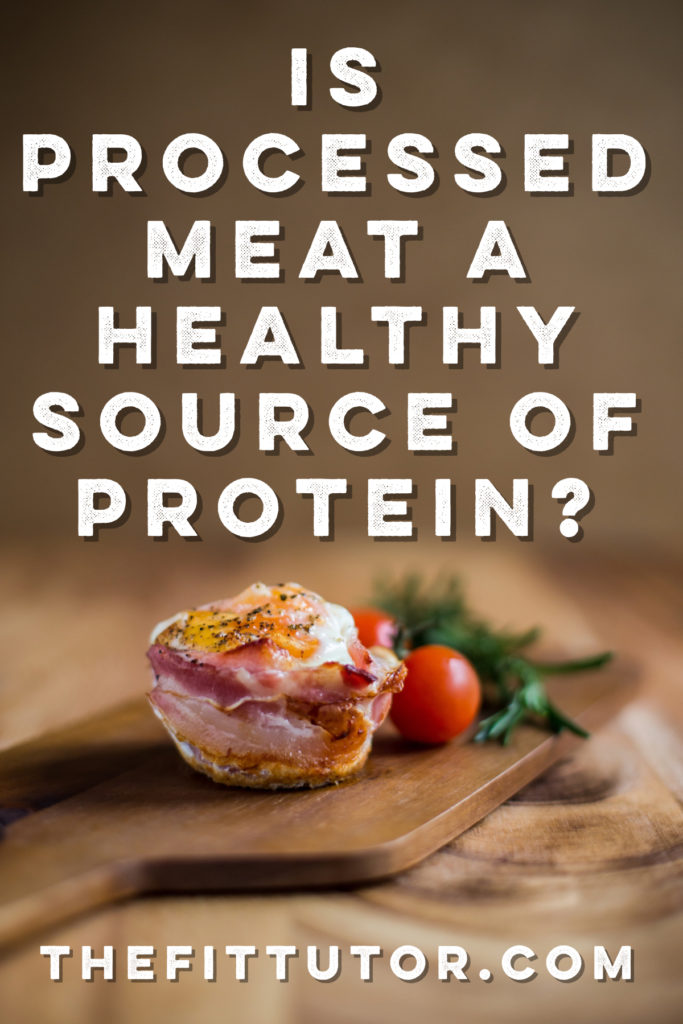You’ve heard over and over again to eat more protein. Bacon everything is all the rage. Processed meats can be high in protein, but are they healthy? Despite studies showing processed meats cause cancer, popular diets and celebrity status for certain meats make them seem like the optimal choice. We are inundated with conflicting information. This article is intended to help clear it up! We’ll first discuss if they’re healthy, then address the protein issue, and finally, how you should proceed.

Are Processed Meats Healthy?
Processed meats can be a decent source of protein, BUT, The World Health Organization says that Processed Meats are a Group 1 Carcinogen, which is also where tobacco smoke and asbestos lie.
Don’t worry, they definitely aren’t as deadly as smoking. They are just in the same class because the cause and effect are now so clear. A Group 1 classification means that consuming them will increase your cancer risk. We can use the word “cause” here instead of “linked to” because the evidence is sufficient.
Processed meat consumption has also been linked to COPD, pregnancy issues, brain tumors, and long-term weight gain.
Clearing Up Definitions and Classifications
This can seem confusing, so here are the definitions of the foods we are talking about, examples of each, and what their official carcinogen classification is, if they have one.
Processed Meat
‘Processed’ meat is meat that’s not sold fresh, but instead has been cured, salted, smoked, or otherwise preserved in some way so things like:
- bacon
- sausages
- hot dogs
- ham
- salami
- deli meat
- beef jerky
- canned meats/meat sauces
- and pepperoni
(But this doesn’t include fresh burgers or mince.)
These are classified as a Group 1 carcinogen, with sufficient evidence consumption causes cancer.
Red Meat
‘Red’ meat entails any meat that’s a dark red color before it’s cooked – examples include beef/steak, lamb, veal, bison, and pork.
This category is a Group 2A carcinogen, meaning consumption has been linked with and probably causes cancer. (Group 2B would say “possibly” causes cancer.)
White Meat
Both red and processed meats are distinct from ‘white’ meats, like fresh chicken or turkey, duck, and fish.
These are not linked with cancer.
So, to summarize:
White Meats = no cancer risk
Red Meats = probable cancer risk
Processed Meats = definite cancer risk
Are Processed Meats a Good Source of Protein?
Yes and no. That clears it up, right! It’s a little complicated…
First off, they’re not a great source since they have the whole cancer-causing label thing going on. But that doesn’t mean you are forced to give up your bacon or pepperoni if you want to lower your cancer risk. We’ll discuss moderation and risk in a second. But keep that in mind that the carcinogen thing is a slight deal-breaker for it being a good protein source. However, many processed meats are high in protein… soooo…
Read Your Labels
If you’re using processed meat as your protein source, check the label. If it’s lean and has quite a bit of protein for the calories, then it can be a good option (keeping in mind the previous paragraph when I use the word “good”). If it has more fat than protein, then you probably shouldn’t be using it as a “protein source.”
Bacon?
Salami?
Pepperoni?
Most have more fat than protein, so yes, you can eat them on occasion to boost your overall protein intake, but if you’re like “oh I need this bacon so my meal has protein” then you’re probably better off without it. It’s not a significant source. And if you’re eating enough of it to be a significant source, you may want to re-think your strategy.
So all that to say… Focus on adding protein to your diet because there are so many benefits! But shift the focus slightly to consuming less processed protein sources. And check your labels.
How To Eat Processed Meats Safely
The World Health Organization isn’t quite sure how processed meats can cause cancer, but they just know they do. They think it’s something inherent in red meat, making processed red meats the most dangerous, in addition to the carcinogenic nitrates added to help preserve the meat.
They also cannot tell us yet how much is “safe” but suggest cutting back. The less processed meats you eat, the lower your risk for certain types of cancer (bowel, and possibly stomach and pancreatic).
The main thing is to start with what you’re eating now… and cut it down a bit. Continue decreasing your intake from there. If this freaks you out and you want to quit cold turkey, then by all means do so.

What the Experts Say About Moderation
Here’s what Cancer Research UK has to say about moderation:
“None of this means that a single meat-based meal is ‘bad for you’. What it does mean is that regularly eating large amounts of red and processed meat, over a long period of time, is probably not the best approach if you’re aiming to live a long and healthy life. Meat is fine in moderation – it’s a good source of some nutrients such as protein, iron and zinc. It’s just about being sensible, and not eating too much, too often.” (1)

General vs. Specific
I personally wouldn’t panic; I would limit. Just like the experts say.
Specifically, here are some guidelines for your moderation. Like the infographic shows, 70g per day is a good goal. According to this study, a person that consumes 50 grams of processed meat per day increases their risk of developing cancer by 18%. Someone who eats 100 grams per day increases their chance by 36%, etc.
Just because you eat processed meat doesn’t mean you’re doomed to get cancer, but you’re putting your body at an increased risk.
If you’re overwhelmed by this change, don’t stress. Many processed meats can be a good source of protein or a good on-the-go lunch. They are OK to eat every once in awhile, but I choose to save them for special occasions or when easy is the only way to go. In my home, we rarely plan meals around them, although we occasionally splurge (mmm… pepperoni) or eat them out of convenience and schedule.
Here’s Where You Can Start
- Limit your processed meats first. For example, how many slices of bacon do you have at breakfast? Cut it down by ⅓ or ½ to start with.
- Cut down how many meals per week include processed meats. Start by reducing the number by 1, and go from there.
- Search for replacement meats and protein sources to have on a more consistent basis.
- Pair processed meats with foods high in vitamin C and antioxidants. Studies suggest they may provide some protection!
Continue to keep this in mind on your journey to eating healthier! If your diet consists of a lot of processed meats, then you’ll want to make cutting back a priority. Doing this gradually is fine, but keep working at it. Cutting back on processed red meats is a good place to start.
Finally, address your red meat consumption. If you’re eating it regularly, start to cut back by 1 meal per week (or day) and go from there. A good goal is 1-2 times per week, or even less if you don’t mind!
But What About Organic or Nitrate-free Meats?
The World Health Organization’s study points the problem to something inherent in all processed meats, but the real answer to this question is outside the scope of their study. If processing is part of the problem, then an organically raised animal from a large pasture turned into sausage is still processed.
…so you’re still going to want to limit it.
But if you’ve read any of my other articles, you’ll know I would suggest organic anyway.
Natural nitrates are better than processed, but choosing nitrate-free meat doesn’t take away the cancer risk. Yes, synthetic nitrates like BHA and BHT are also under fire for their safety being questionable, so avoiding them is a great plan. I would still encourage you to limit your intake since part of the problem is within the meat itself, but choose nitrate-free processed meats when possible.
Summing it Up!
So all that to say, processed meats aren’t healthy, but they can add protein to your diet. Don’t rely on them as a good protein source regularly, but rarely to occasionally is fine. Work on cutting back on both processed and red meats by replacing them with healthier choices until you meet the recommended amounts!
Any questions? Want to learn how to eat better for health and for weight loss? Check out my Nutrition Course!
I know, saying yes to bacon and pepperoni less is sad for me, too. But the world needs us healthy, and taking care of our bodies is one of the best gifts we can give our loved ones!
Further Reading
(1) Dunlop, Casey. “Processed meat and cancer – what you need to know.” Cancer Research UK – Science blog, 26 Oct. 2015, scienceblog.cancerresearchuk.org/2015/10/26/processed-meat-and-cancer-what-you-need-to-know/.



Comments are closed.